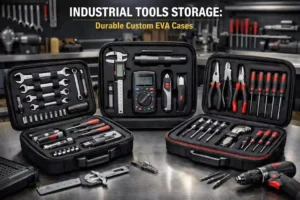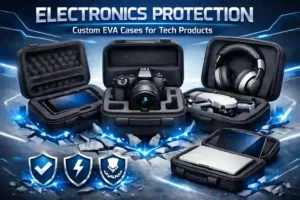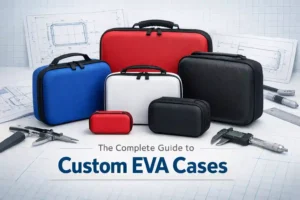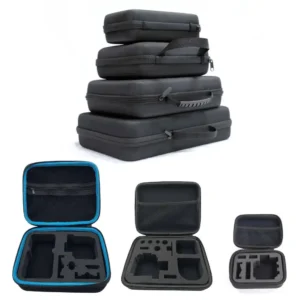What Are the Differences Between EVA, EPE, and Sponge Materials?
When it comes to protective packaging, electronic storage cases, and cushioning solutions, three materials are commonly used: EVA foam, EPE foam (expanded polyethylene), and sponge (polyurethane foam). Each has unique properties and advantages, making them suitable for different industries such as electronics, medical devices, household goods, toys, and more.
In this article, we will explore the differences between EVA, EPE, and sponge—helping manufacturers, retailers, and distributors choose the right material for their business needs.
1. EVA Foam (Ethylene-Vinyl Acetate)
EVA is a copolymer of ethylene (E) and vinyl acetate (VA). It is widely recognized as a new-generation eco-friendly packaging material.
Key Features of EVA:
Waterproof and moisture-resistant
Shockproof and anti-vibration
Excellent sound insulation and thermal insulation
Flexible and resilient, with high toughness
Customizable colors, shapes, and densities
Eco-friendly and recyclable
Because of its versatility, EVA is widely applied in:
Electronics packaging and protective cases
Sports equipment and footwear midsoles
Medical device packaging
Luxury packaging and promotional gift boxes
👉 According to Plastics Europe, EVA is considered an ideal replacement for traditional foams, combining strength, resilience, and sustainability.
2. EPE Foam (Expanded Polyethylene, also known as Pearl Cotton)
EPE is a high-foamed polyethylene product made primarily from LDPE (low-density polyethylene), expanded using butane foaming technology.
Key Features of EPE:
Lightweight with strong elasticity
Soft surface, preventing scratches during packaging
Excellent shock absorption and impact resistance
Moisture-proof, oil-resistant, and chemical-resistant
Customizable with antistatic and flame-retardant properties
Economical and widely available
EPE is commonly used in:
Appliances and electronics packaging
Furniture protection
Precision instruments
Logistics and shipping materials
👉 Packaging Europe highlights EPE as one of the most widely used foams in protective packaging thanks to its cost-effectiveness and versatility.
3. Sponge (Polyurethane Foam, PU)
Sponge, scientifically known as polyurethane soft foam, has long been used in everyday consumer products. It can be divided into polyester-based PU and polyether-based PU, with subtypes like high resilience, medium resilience, and memory foam.
Key Features of Sponge:
Extremely soft and flexible texture
Good cushioning and vibration absorption
Available in various densities and shapes
Can be molded into different designs
Applications: shock absorption, filling, insulation, cleaning tools, and toys
However, sponge has limitations:
Low heat resistance (up to 200°C)
Flammable (requires flame-retardant additives)
Less durable compared to EVA and EPE
👉 According to Polyurethane.org, PU foams remain essential in industries like furniture, automotive, and toys, but are less eco-friendly compared to EVA.
Key Differences Between EVA, EPE, and Sponge
| Feature | EVA Foam | EPE Foam (Pearl Cotton) | Sponge (PU Foam) |
|---|---|---|---|
| Weight | Heavier, dense | Lightweight, airy | Light, soft |
| Durability | Highly durable, long-lasting | Good, but deforms under pressure | Medium, prone to wear |
| Shock Absorption | Excellent | Good | Moderate |
| Water Resistance | High | Very high (almost no water absorption) | Low |
| Eco-Friendliness | Recyclable, eco-friendly | Economical, partially recyclable | Less eco-friendly |
| Applications | Electronics, packaging, sports, medical | Furniture, appliances, shipping | Toys, cushions, cleaning, filling |
Final Thoughts
Choosing between EVA, EPE, and sponge materials depends on your industry needs:
EVA foam is ideal for high-end electronics, medical packaging, and premium storage cases.
EPE foam is perfect for mass packaging, furniture, and transport protection.
Sponge (PU foam) remains useful for toys, daily use, and cushioning products.
As global demand for eco-friendly and durable packaging grows, more companies are investing in EVA-based solutions due to their strength, resilience, and sustainability.
👉 If you are an Amazon seller, OEM/ODM buyer, or distributor looking for custom EVA/EPE cases, visit our company website to explore tailored solutions for your business.





